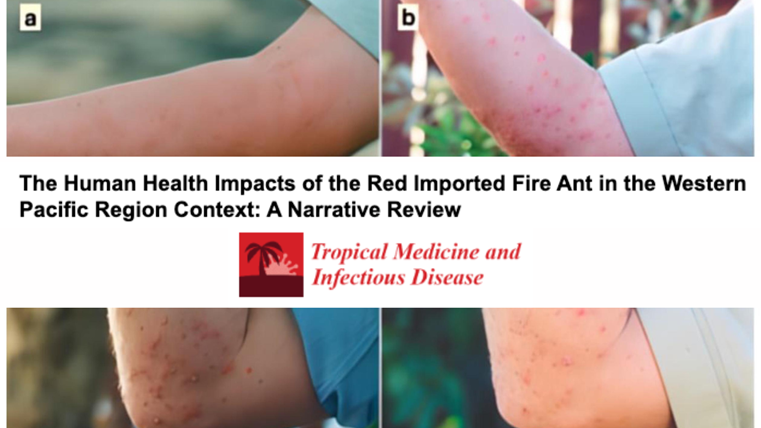The Human Health Impacts of the Red Imported Fire Ant in the Western Pacific Region Context: A Narrative Review
- Published
- Wednesday, March 27, 2024 - 9:00 AM

The potential for red imported fire ants to establish themselves as an invasive species in the Western Pacific Region presents a substantial and costly health issue, according to National Allergy Centre of Excellence researchers, who wrote a Narrative Review published in Tropical Medicine and Infectious Diseases today.
RIFA stings are painful and can lead to allergic reactions, including life-threatening anaphylaxis, yet health impacts remain inadequately defined, wrote Dr Diego Lopez, Associate Professor Kenneth Winkle, Dr Troy Wanandy, Professor Sheryl van Nunen, Professor Kirsten Perrett and Professor Adrian Lowe.
Their investigations showed:
- Approximately a third of the population in RIFA-infested areas are stung each year
- The most frequent reaction is a sterile 1–2 mm pseudo pustule on the skin
- Approximately 20% of stings cause a large local reaction
- Between about 0.5% and 2% of stings cause a systemic allergic reaction, which can range from skin symptoms to life-threatening anaphylaxis
- Local biodiversity is also significantly disrupted by invading RIFA and may lead to complex adverse effects on human health, from agriculture losses to expanded ranges for pathogen vectors.
Successful eradication and surveillance programs, to identify and eradicate new incursions, would avoid substantial health impacts and costs, the researchers stated.
NACE and Allergy & Anaphylaxis Australia experts also addressed a Senate inquiry on 5 March with the report due to be handed down by the Australian Government Rural and Regional Affairs and Transport References Committee on 18 April. Our submission called for:
- Permanent biosecurity surveillance to immediately identify red fire ant incursions
- Improved healthcare to better treat and manage patients
- Greater public health awareness campaigns
- Investment in research, including treatment therapies.









